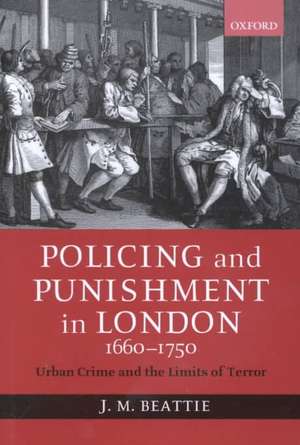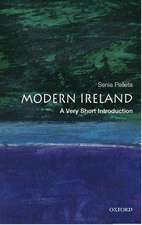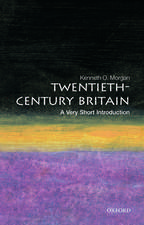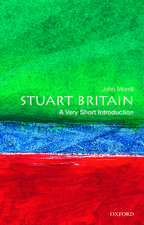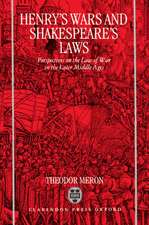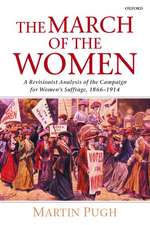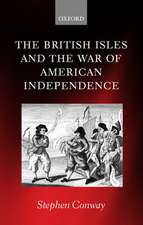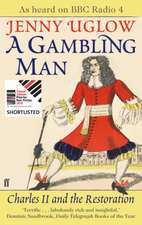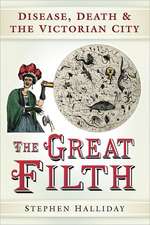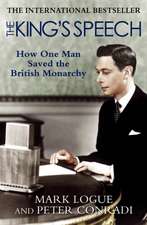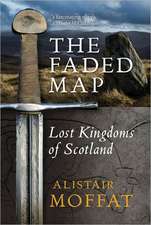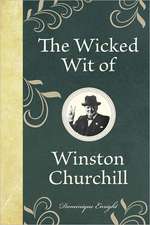Policing and Punishment in London 1660-1750: Urban Crime and the Limits of Terror
Autor J. M. Beattieen Limba Engleză Hardback – 26 iul 2001
| Toate formatele și edițiile | Preț | Express |
|---|---|---|
| Paperback (1) | 503.52 lei 31-37 zile | |
| OUP OXFORD – 28 noi 2002 | 503.52 lei 31-37 zile | |
| Hardback (1) | 1247.59 lei 31-37 zile | |
| OUP OXFORD – 26 iul 2001 | 1247.59 lei 31-37 zile |
Preț: 1247.59 lei
Preț vechi: 1893.69 lei
-34% Nou
Puncte Express: 1871
Preț estimativ în valută:
238.76€ • 246.65$ • 198.71£
238.76€ • 246.65$ • 198.71£
Carte tipărită la comandă
Livrare economică 15-21 martie
Preluare comenzi: 021 569.72.76
Specificații
ISBN-13: 9780198208679
ISBN-10: 0198208677
Pagini: 512
Ilustrații: 8 pp black & white plates, 1 map
Dimensiuni: 163 x 242 x 33 mm
Greutate: 0.86 kg
Editura: OUP OXFORD
Colecția OUP Oxford
Locul publicării:Oxford, United Kingdom
ISBN-10: 0198208677
Pagini: 512
Ilustrații: 8 pp black & white plates, 1 map
Dimensiuni: 163 x 242 x 33 mm
Greutate: 0.86 kg
Editura: OUP OXFORD
Colecția OUP Oxford
Locul publicării:Oxford, United Kingdom
Recenzii
... rich study ... will be required reading for anyone interested in the history of London's policing.
We know Beattie's work by now: path breaking, authoritative, detailed. He produces a whole range of fascinating material, the kind of material that can be uncovered only by systematic archival work ... Quite simply Policing and Punishment in London 1660-1750 should be read by all those with an interest in the period or in the history of crime and policing.
Beattie's great strength is in the way he draws together different methodologies. The result is that for the reader, this book can be read on many levels. For the student of criminal justice, it provides a reference book, to be dipped into at will. For the historian of trends and patterns of crime and law enforcement, it provides both breadth and depth - quantitative and qualitative analyses of change. For the historian of culture, it provides a context against which to read the vast literature, both manuscript and printed, which survives from the eighteenth century. For the historian from below, it provides insights into both the ordinary and extraordinary lives of those involved in the business of crime. As a result this book will endure as a remarkable legacy to future historians of crime.
... the vigorous research and methodology that underpin this book should also be highlighted. Few historians of crime are capable of matching Beattie in the sheer volume of material he draws upon.
John Beattie's Crime and the Courts in England, 1660-1800 (Oxford, 1986) achieved the rare status of becoming an indispensable text-book. That John Beattie has managed to so the same again with this second book seems an immense achievement.
There are many other aspects of law enforcement and judicial processes which Beattie reflects on in this rich study. Like his earlier book this one will be required reading for anyone interested in the history of London's policing, the nature of the city watch, the processes of 'thief-taking' and the problems of corruption in criminal law enforcement.
Never before has the way that London's authorities and the city's criminal problems dominated national policy been more strikingly demonstrated.
This is a brilliant book that will repay the attention of all early modern historians.
... this is an excellent book that will do much to shape the history of criminal justice for generations to come.
In apparent asides to his main subject Beattie also gives us histories of everything from street lighting to watchboxes, and adds substantially to our understanding of the development of the City of London as a physical and social entity.
John Beattie has created a comprehensive guide to the development of the Old Bailey and the institutions of the City of London that made it work in the all-important period between the Restoration and the middle of the eighteenth century. He has created a piece of historical writing whose scholarship is overwhelming, and which provides a more robust and impressively detailed narrative of the history of criminal justice in this period than has ever been attempted before.
In a work of immense scholarship, Beattie makes his case well ... Beattie is able to display great craft, knowledge, insight and application in establishing his thesis. This is a major work which will prove of enduring importance.
Valuable new analysis of the changing forms of policing and prosecution ... This is an exemplary study of the formation of policing and penal policy, which admirably examines the influence of all levels of government, from parliament and ministers on the one hand to watchmen, constables and thief-takers on the other.
A book of immense scholarship which opens up new and important windows into crime and law enforcement in London, and by extension England, in the late seventeenth and early eighteenth centuries.
In Policing and Punishment in London Beattie succeeds triumphantly in pursuing the linked themes of the importance of the experience of law enforcement in London, and of how the century after 1650 witnessed significant new developments in attitudes to crime ... richly documented, immensely intelligent, and supremely well written book.
John Beattie is among the finest exponents of this more historically sensitive approach to crime and punishment ... Crime and the Courts in England 1660-1800(1986) - a pioneering study of trends in crime and prosecution in Surrey - may now be seen as a prelude to a masterpiece. Policing and Punishment in London 1660-1750 bears all the marks of protracted archival digging followed by mature reflection ... [It] is a splendid achievement.
Meticulously presented and thoroughly convincing work by an acknowledged master of his subject. It illuminates many dimly lit areas both in the history of the criminal justice system and in the governance of early modern London, and is likely to remain a standard work on both subjects for many years to come.
Beattie pulls off one of the hardest tricks of all by organizing his book along thematic and chronological lines, ensuring that by 1750 we feel the weight and significance of the developments he identifies ... this is a book with a solid statistical basis, but less concerned with positivist interpretation and more with how contemporaries understood fluctuating levels of indicted crime ... fine, illuminating book.
We know Beattie's work by now: path breaking, authoritative, detailed. He produces a whole range of fascinating material, the kind of material that can be uncovered only by systematic archival work ... Quite simply Policing and Punishment in London 1660-1750 should be read by all those with an interest in the period or in the history of crime and policing.
Beattie's great strength is in the way he draws together different methodologies. The result is that for the reader, this book can be read on many levels. For the student of criminal justice, it provides a reference book, to be dipped into at will. For the historian of trends and patterns of crime and law enforcement, it provides both breadth and depth - quantitative and qualitative analyses of change. For the historian of culture, it provides a context against which to read the vast literature, both manuscript and printed, which survives from the eighteenth century. For the historian from below, it provides insights into both the ordinary and extraordinary lives of those involved in the business of crime. As a result this book will endure as a remarkable legacy to future historians of crime.
... the vigorous research and methodology that underpin this book should also be highlighted. Few historians of crime are capable of matching Beattie in the sheer volume of material he draws upon.
John Beattie's Crime and the Courts in England, 1660-1800 (Oxford, 1986) achieved the rare status of becoming an indispensable text-book. That John Beattie has managed to so the same again with this second book seems an immense achievement.
There are many other aspects of law enforcement and judicial processes which Beattie reflects on in this rich study. Like his earlier book this one will be required reading for anyone interested in the history of London's policing, the nature of the city watch, the processes of 'thief-taking' and the problems of corruption in criminal law enforcement.
Never before has the way that London's authorities and the city's criminal problems dominated national policy been more strikingly demonstrated.
This is a brilliant book that will repay the attention of all early modern historians.
... this is an excellent book that will do much to shape the history of criminal justice for generations to come.
In apparent asides to his main subject Beattie also gives us histories of everything from street lighting to watchboxes, and adds substantially to our understanding of the development of the City of London as a physical and social entity.
John Beattie has created a comprehensive guide to the development of the Old Bailey and the institutions of the City of London that made it work in the all-important period between the Restoration and the middle of the eighteenth century. He has created a piece of historical writing whose scholarship is overwhelming, and which provides a more robust and impressively detailed narrative of the history of criminal justice in this period than has ever been attempted before.
In a work of immense scholarship, Beattie makes his case well ... Beattie is able to display great craft, knowledge, insight and application in establishing his thesis. This is a major work which will prove of enduring importance.
Valuable new analysis of the changing forms of policing and prosecution ... This is an exemplary study of the formation of policing and penal policy, which admirably examines the influence of all levels of government, from parliament and ministers on the one hand to watchmen, constables and thief-takers on the other.
A book of immense scholarship which opens up new and important windows into crime and law enforcement in London, and by extension England, in the late seventeenth and early eighteenth centuries.
In Policing and Punishment in London Beattie succeeds triumphantly in pursuing the linked themes of the importance of the experience of law enforcement in London, and of how the century after 1650 witnessed significant new developments in attitudes to crime ... richly documented, immensely intelligent, and supremely well written book.
John Beattie is among the finest exponents of this more historically sensitive approach to crime and punishment ... Crime and the Courts in England 1660-1800(1986) - a pioneering study of trends in crime and prosecution in Surrey - may now be seen as a prelude to a masterpiece. Policing and Punishment in London 1660-1750 bears all the marks of protracted archival digging followed by mature reflection ... [It] is a splendid achievement.
Meticulously presented and thoroughly convincing work by an acknowledged master of his subject. It illuminates many dimly lit areas both in the history of the criminal justice system and in the governance of early modern London, and is likely to remain a standard work on both subjects for many years to come.
Beattie pulls off one of the hardest tricks of all by organizing his book along thematic and chronological lines, ensuring that by 1750 we feel the weight and significance of the developments he identifies ... this is a book with a solid statistical basis, but less concerned with positivist interpretation and more with how contemporaries understood fluctuating levels of indicted crime ... fine, illuminating book.
